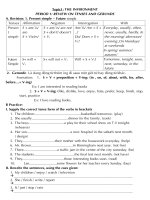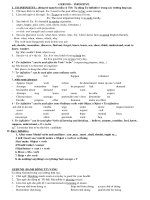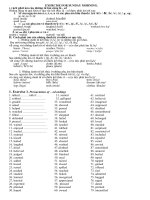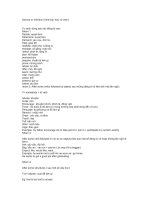Ifinitive and Gerund
Bạn đang xem bản rút gọn của tài liệu. Xem và tải ngay bản đầy đủ của tài liệu tại đây (164.7 KB, 4 trang )
<span class='text_page_counter'>(1)</span><div class='page_container' data-page=1>
Gerund and Infinitive prepared by English teacher Tran Xuan Thoai – Kien Luong High School
<b>GRAMMAR FOCUS ( Unit 1 – E 11 )</b>
<b>I.Infinitive with “ to”</b>
* “To – Inf” Thường được dùng trong các trường hợp sau :
<b>1. S + Verbs + to – inf</b>
: “ To – inf” được dùng làm túc từ cho một số động từ thông dụng như :- afford : có đủ ( tiền , khả năng ) - hope : hy vọng
- agree : đồng ý - learn : học
- appear : xuất hiện - manage : xoay xở, quyết định
- arrange : sắp xếp - offer : tự nguyện
- attempt : cố gắng - plan : dự định, lên kế hoạch
- ask : hỏi, yêu cầu - pretent : giả vờ
- choose : chọn lựa - promise : hứa
- decide : quyết định - refuse : từ chối
- demand : đòi hỏi - resolve, determine : quyết tâm
- expect : mong đợi - threaten : đe dọa
- fail : thất bại - want : muốn
- happen : xảy ra, diễn ra - wish : mong muốn
- hesitate : do dự - would like = want
<b>Examples</b> :
+ I like both of these, but I can’t afford <b>to buy</b> eitheir of them.
+ Minh chose <b>to work</b> in a company instead of going to university.
<b>2. </b>
<b>S + Verbs + object + to-inf :</b>
- Advise sb. ( not ) to do sth : Khuyên ai làm ( khơng làm ) việc gì
- allow sb. to do sth : cho phép ai làm gì
- ask sb. ( not ) to do sth : yêu cầu ai làm ( khơng làm ) gì
- enable sb to do sth : tạo điều kiện cho ai làm gì
- encourage sb. to do sth : khuyến khích ai làm gì
- forbid sb. to do sth : cấm ai làm gì
- force sb. to do sth : bắt / ép buộc ai làm gì
- invite sb. to do sth : mời ai làm gì
- order sb. to do sth : ra lệnh cho ai làm gì
- permit sb. to do sth : cho phép ai làm gì
- persuade sb. to do sth : thuyết phục ai làm gì
- remind sb. to do sth : nhắc nhở ai làm gì
- request sb. to do sth : yêu cầu ai làm gì
- tell sb. to do sth : bảo ai làm gì
- urge sb. to do sth : thúc dục ai làm gì
- want sb. to do sth : muốn ai làm gì
- warn sb. ( not ) to do sth : cảnh báo ai ( đừng ) làm gì
-Would like sb. to do sth : muốn ai làm gì
<b>Examples</b> :
+ My teacher advised us to learn harder.
S V O To-inf
+ The officer ordered his sodiers to move forward .
S V O To-inf
<b>3. To-inf : được dùng làm chủ từ cho các động từ như : appear, be seem và các động từ nối khác ( linking </b>
<b>verbs) . Tuy nhiên trong trường hợp này chúng ta thường dùng cách nói bắt đầu bằng chù từ giả “ It” . </b>
<b>( It + be/ seem / … + adj + ( for – o ) + to-inf )</b>
<b>Examples</b> :
+ <b>To drive</b> on slippery roads is dangerous .
</div>
<span class='text_page_counter'>(2)</span><div class='page_container' data-page=2>
Gerund and Infinitive prepared by English teacher Tran Xuan Thoai – Kien Luong High School
S V
= >It is dangerous <b>to drive</b> on slippery roads .
+ <b>To solve</b> the traffic problems seems impossible .
=> It seems impossible <b>to solve</b> the traffic problems.
+ This Maths problem is not easy (for me ) to solve.
=> It is not easy (for me ) to solve.
( Chú ý : Khi <b>To-inf</b> làm chủ từ thì <b>động từ chia ở hình thức số ít</b> )
<b>4.To-inf : được dùng trong một số cấu trúc : </b>
- It + cost + O + to-inf . - It + take + ( O )+ time + to-inf
- S + be + too + adj + ( for – O ) + to- inf + ... - S + be( not ) + adj + enough + ( for – O ) + to- inf + ...
- S / It + be + adj + (for – O ) + to- inf
<b>Examples</b> :
+ It’ll cost a lot of money to make a trip around the world.
+ It would take ( me ) two hours to do this exercise.
+ Milk is too hot ( for the baby ) to drink.
<b>5.To-inf : còn được dùng để rút gọn mệnh đề quan hệ, và dung sau các từ ( the first / the second / the </b>
<b>last / the only + ( noun ).</b>
<b>Examples</b> :
+ She bought some new clothes which she could wear during the holiday.
Relative clause
=> She bought some new clothes <b>to wear</b> during the holiday.
+ Who was the first student who found out the answer ?
Relative clause
=> Who was the first student to find out the answer ?
<b>6. To-inf : dùng để chỉ mục đích .</b>
<b>+ </b>She goes to the bank to borrow some money.
<b>7. Verbs + how / what / when / where / which / why + to-inf .</b>
+ I don’t remember when to hand the report.
+ He taught me how to play the guitar.
<b>II. Infinitive without “ to” ( Bare- infinitive ) </b>: Được dùng trong các trường hợp sau :
<b>1.Sau các trợ động từ don’t / doesn’t / didn’t / will / shall và các động từ khiếm khuyết như can / could / </b>
<b>would / may / might / must / should / ought to / would rather / had better .</b>
<b>Examples</b> : + She doesn’t know where to go .
+ You must write this letter again .
<b>2.Dùng sau động từ : Make / Let + O + Bare-inf </b>
Examples : + They made me cry .
+ My parents let me use the family motorbike.
( Nếu động từ “make” được dùng ờ thể bị động thì sau nó phải là “ to-inf” )
+ The cashier was made to hand the money by the robber.
<i>*. Động từ “ let” khi đổi sang bị động là “ be allowed” </i>
+ My parents let me go out tonight. -> I am allowed to go out tonight.
<i>( sau động từ “ help” cũng có thể dùng “ bare-inf” )</i>
<b>3.Sau một số động từ chỉ giác quan như : see, hear, watch, notice, find ( nhận thấy ), feel. ( Các động từ </b>
<b>trên cũng có thể được theo sau bằng “V- ing”khi muốn diễn tả hành động đang xảy ra.)</b>
+ I saw that man take your bike.
<b>III</b><i>. </i><b>Gerund ( V- ing )</b>
<b>1. Gerund used as a subject</b>
<b>Ex : </b><i><b>Swimming</b></i> is good for your health.
<b>2.Gerund used as a object of verbs: </b>
</div>
<span class='text_page_counter'>(3)</span><div class='page_container' data-page=3>
Gerund and Infinitive prepared by English teacher Tran Xuan Thoai – Kien Luong High School
admit : thừa nhận
* allow : cho phép
anticipate : liệu trước
* advise : khuyên
appreciate : đánh giá cao
avoid : traùnh
be worth : đáng (được)
can’t help : không thể tránh
complete : hoản thành
consider : xem xét, cân nhắc,cứu xét
defer : hỗn lại
delay = postpone : trì hỗn, hỗn lại
deny : phủ nhận
dislike / detest : không thích
dread : sợ
enjoy : thích
escape : thốt khỏi
fancy : thích
finish : hồn thành
forgive : tha thứ
encourage : khuyến khích
imagine : tưởng tượng
recomment : giới thiệu
report : thuật lại
support : ủng hộ
involve : bao goàm, lieân quan
keep = continue : tiếp tục
mention : đề cập
miss : bỏ lỡ
not mind : không ngại
mind = object to : phiền hà , phản đối
* permit : cho pheùp
practise : luyện tập
resent : phật ý, khơng hài lịng
recall = recollect : hồi tưởng lại, nhớ lại
spend : dùng, trãi qua
suggest : gợi ý, đề nghị
* teach : dạy
understand : hieåu
discontinue : không tiếp tục
discuss : thảo luận, bàn bạc
endure = bear = stand : chịu đựng
explain : giải thích
prevent : ngăn cản
prohibit : cấm, ngăn cấm
quit = give up : bỏ, thơi làm gì
resist : chống lại
risk : liều, mạo hiểm
Ex : We discussed <i><b>selling</b></i> the old car. / He admitted <i><b>cheating</b></i> on the test.
( Các động từ được đánh dấu “ *” nếu theo cấu trúc : S +V + O + to – inf )
<b>3.Gerund used as a object of preposition : </b>
+) Adj + Pre + Gerund
+) Noun + Pre + Gerund
+) Verb + Pre + Gerund
Ex : Mary is crazy about <i><b>playing</b></i> tennis. ( crazy about = fond of : thích )
There’s no interest in writing letters.
Sue dreams of being a pop star.
<b>4. Gerund used follow the phrases as : </b>
*. be busy *. can’t / couldn’t help: không thể nhịn được
*. can’t stand / bear / face : không chịu nổi *. feel like : cảm thấy thích / muốn
*. It’s no use / good: không ích gì, vơ ích,thật vơ ích *.object to:phản đối
*. There’s no point in: khơng cần thiết, chẳng ích lợigì *.have difficulty/trouble
*. It’s ( not ) worth: đáng để làm / khơng đáng để làm *.it’s waste of time:lãng phí thời gian
*.<b>look forward to</b>:mong chờ *.be (get) used to : quen với
*.be (get) accustomed to:quen với
Ex : He is busy reading the paper. / She couldn’t help <i><b>laughing</b></i>.
<b>5.Gerund used as subjective / objective complements ( bổ ngữ chủ ngữ / tân ngữ )</b>
- Gerund used as subjective complements :
Ex : My favourite sport is <i><b>swimming</b></i>.
<b>6. Gerund used as objective complements : S + V + O + O.C </b>
sau một số động từ như : call , catch, discover, feel, find, hear, get, imagine, keep, leave, notice, see, send, set, stop,
watch.
</div>
<span class='text_page_counter'>(4)</span><div class='page_container' data-page=4>
Gerund and Infinitive prepared by English teacher Tran Xuan Thoai – Kien Luong High School
Ex : I saw him <i><b>crossing</b></i> the street.
<b>* . </b>Độâng từ theo sau là gerund (V - ing ) hay to-infinitive: (Không thay đổi nghĩa)
begin / start : bắt đầu
can’t bear : không thể chịu đựng
can’t stand : không thể chịu đựng
continue : tiếp tục
intent : dự định, có ý định
hate : gheùt
like : thích
love : yeâu
neglect : lơ là
prefer : thích hơn
Ex: She began working / to work on the project.
<b>*</b>. Đông từ theo sau là gerund ø (V –ing) hoặc to-infinitive: (thay đổi nghĩa)
Forget + to-inf (qn làm việc gì)
Forget + V-ing . (làm việc rồi mà quên )
Don’t forget to send me a postcard.
I will never forget working with you. (quên đã làm)
Remember + to-inf (nhớ để làm)
Remember + V-ing (nhớ đã làm việc gì rồi)
Remember to do your homework. )
Do you remember meeting the president last year?
Stop + to-inf (dừng lại để làm gì.)
Stop + V-ing ( dừng hẳn không làm nữa) He stopped to smoke when he was driving. He stopped smoking .
Try + to-inf : cố gắng
Try + V-ing : thử We tried to win the game, but we failed.She tries putting on the red hat.
Mean + to-inf: muốn
Mean + Ving: nghóa là I mean to take a trip to Canada.A trip to Da Lat means spending much money.
Regret + to-inf : rất tiếc về việc gì sẽ làm
Regret + Ving : hối hận ( ân hận )vìđã làm
việc gì rồi
We regret to say that your application can’t be accepted.
He regrets not going to her friend’s birthday party.
<b>PASSIVE INFINITIVE AND PASSIVE GERUND</b>
1. Passive infinitive : Infinitive được dùng ở dạng bị động có cơng thức sau : <b>(to) be + P.P ( Ved / V3 )</b>
được dùng giống như “Infinitive : To – inf / Bare - inf” nhưng mang nghĩa bị động.
Ex1 : I don’t want anyone to disturb me. ( Active ) => I don’t want <i><b>to be disturbed.</b></i> ( Passive )
- You have to rewrite this report. ( Active ) => This report has <b>to be rewritten</b>. ( Passive )
Ex 2 : They can’t solve the problem. ( Active ) => The problem can’t <i><b>be solved.</b></i>
2. GERUND được dùng ở dạng bị động có cơng thức sau : <b>being +P.P ( Ved / V3 )</b> được dùng giống như
Gerund nhưng mang nghĩa bị động.
EX : - He enjoys people admiring him. ( Active ) => He enjoys <b>being admired</b>. ( Passive )
- She hates being criticized by her teacher.
<b>The end </b>
</div>
<!--links-->









